General Rules
The Binary and Quadrature PSK Award Series [BQPA] was devised by the European PSK Club on 31st August 2006. This was to sponsor a series of PSK awards based on different binary and quadrature PSK boud rate two-way digital contacts. There are six different BQPA awards available at the moment: BPSK31 Award, BPSK63 Award, BPSK125 Award, QPSK31 Award, QPSK63 Award and QPSK125 Award. Any BQPA award may be claimed by any licensed radio amateur, club station or SWL eligible under EPC Awards General Rules who can produce evidence of having contacted/monitored amateur radio stations by using different binary and quadrature PSK boud rate modes. Credit will be given for contacts made on any of the amateur bands below 30 MHz. Contacts with none EPC members have no date/time restrictions; contacts with EPC members must be made on or after 10th June 2006.
Technical Information
The Phase Shift Keying (PSK) is a method of digital communication in which the phase of a transmitted signal is varied to convey information. There are several methods that can be used to accomplish PSK. The main advantage of PSK is its excellent signal-to-noise ratio, which allows communication under adverse conditions such as severe fading, noise, or interference where other communications modes fail.
The simplest PSK technique is called binary phase-shift keying (BPSK). It uses two opposite signal phases (0 and 180 degrees). The digital signal is broken up timewise into individual bits (binary digits). The state of each bit is determined according to the state of the preceding bit. If the phase of the wave does not change, then the signal state stays the same (0 or 1). If the phase of the wave changes by 180 degrees - that is, if the phase reverses - then the signal state changes (from 0 to 1, or from 1 to 0). Because there are two possible wave phases, BPSK is sometimes called biphase modulation.
In quadrature phase-shift keying (QPSK) are four phases (0, +90, -90, and 180 degrees), and each phase shift represents two signal elements. In QPSK, data can be transmitted at a faster rate, relative to the number of phase changes per unit time, than is the case in BPSK.
The BQPA awards are based on contacts made with three data transmission rates - 31.25, 62.5 and 125 baud. Baud was the prevalent measure for data transmission speed until replaced by a more accurate term, BPS (bits per second). One baud is one electronic state change per second. Since a single state change can involve more than a single bit of data, the BPS unit of measurement has replaced it as a better expression of data transmission speed. The measure was named after a French engineer, Jean-Maurice-Emile Baudot. It was first used to measure the speed of telegraph transmissions.
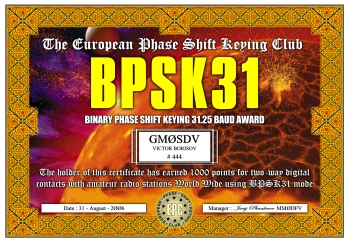
The BPSK31 award may be claimed by any EPC member eligible under the BQPA General Rules listed above who can produce evidence of having earned 1000 points for contacts with any amateur radio stations by using BPSK31 mode (31.25 baud rate). Each contact with EPC member is worth 5 points. Each contact with none EPC member is worth 1 point. The final score is the result of the total QSO points.
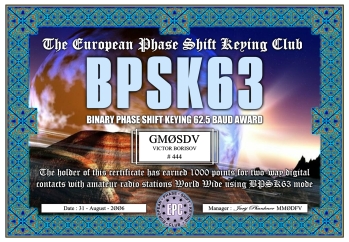
The BPSK63 award may be claimed by any EPC member eligible under the BQPA General Rules listed above who can produce evidence of having earned 1000 points for contacts with any amateur radio stations by using BPSK63 mode (62.50 baud rate). Each contact with EPC member is worth 5 points. Each contact with none EPC member is worth 1 point. The final score is the result of the total QSO points.
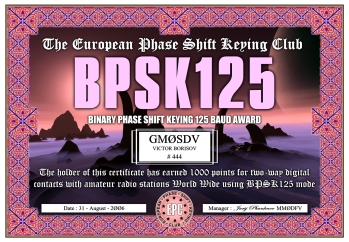
The BPSK125 award may be claimed by any EPC member eligible under the BQPA General Rules listed above who can produce evidence of having earned 1000 points for contacts with any amateur radio stations by using BPSK125 mode (125 baud rate). Each contact with EPC member is worth 10 points. Each contact with none EPC member is worth 2 points. The final score is the result of the total QSO points.
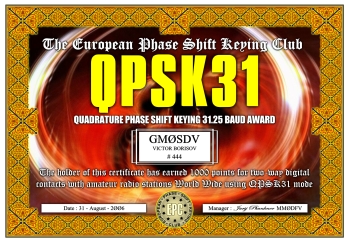
The QPSK31 award may be claimed by any EPC member eligible under the BQPA General Rules listed above who can produce evidence of having earned 1000 points for contacts with any amateur radio stations by using QPSK31 mode (31.25 baud rate). Each contact with EPC member is worth 5 points. Each contact with none EPC member is worth 1 point. The final score is the result of the total QSO points.
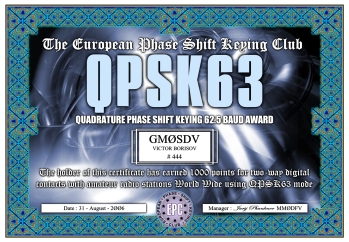
The QPSK63 award may be claimed by any EPC member eligible under the BQPA General Rules listed above who can produce evidence of having earned 1000 points for contacts with any amateur radio stations by using QPSK63 mode (62.5 baud rate). Each contact with EPC member is worth 5 points. Each contact with none EPC member is worth 1 point. The final score is the result of the total QSO points.
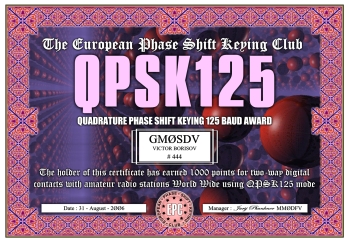
The QPSK125 award may be claimed by any EPC member eligible under the BQPA General Rules listed above who can produce evidence of having earned 1000 points for contacts with any amateur radio stations by using QPSK125 mode (125 baud rate). Each contact with EPC member is worth 10 points. Each contact with none EPC member is worth 2 points. The final score is the result of the total QSO points.

